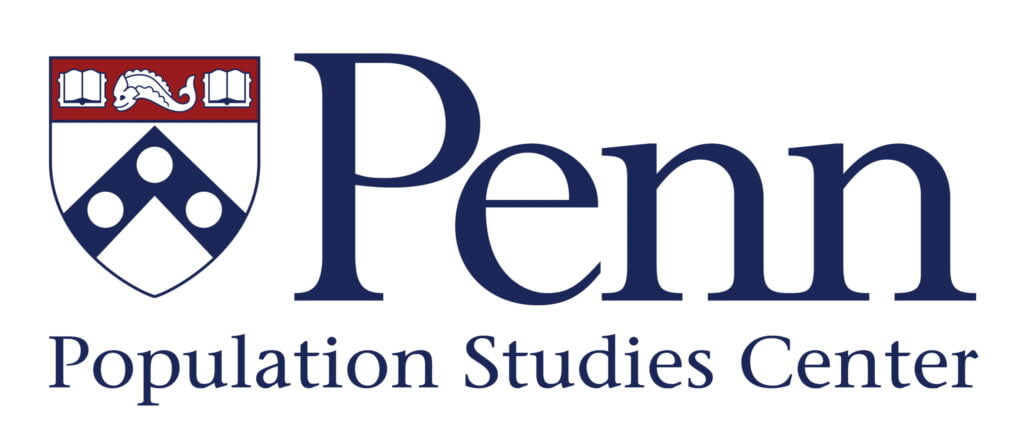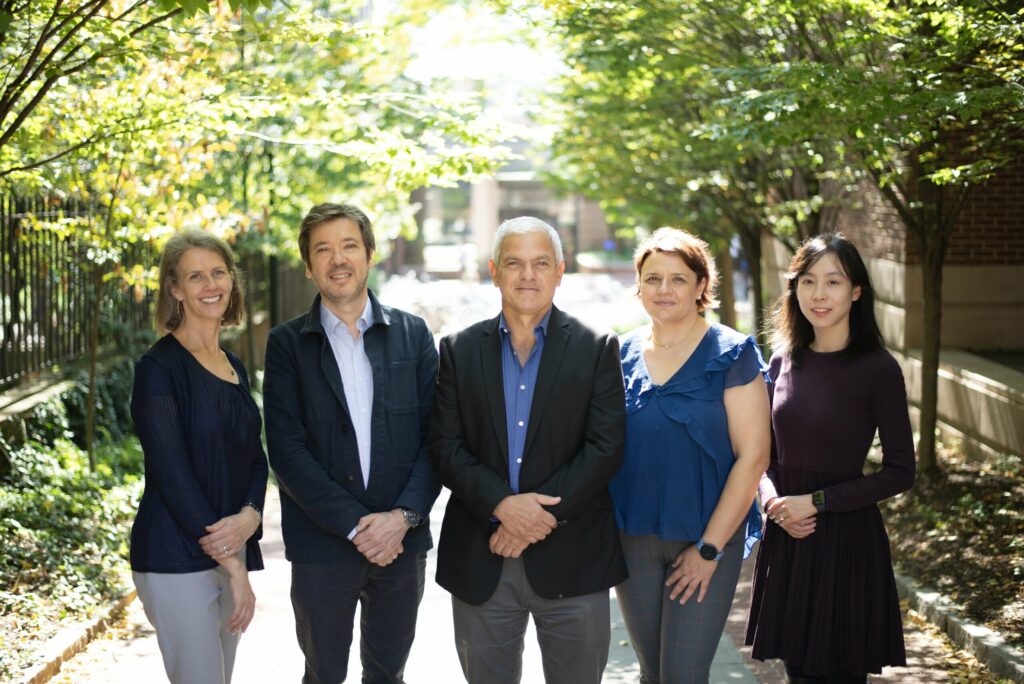University of Pennsylvania Population Studies Center
Sameera Nayak Tell us about your institution. What is the mission of the institution?
Tell us about your institution. What is the mission of the institution?
The Population Studies Center (PSC) at the University of Pennsylvania (Penn) was founded in 1962 and is an international leader in research and training on the dynamic structure, organization, and health and well-being of human populations.
The PSC is home to over 60 Research Associates from more than a dozen departments and schools at Penn representing the social sciences, communications, law, public policy, medicine, nursing, and health care management and health policy. The interdisciplinary environment at the PSC encourages associates to develop collaborative synergies in research, training, and methodological innovation to address the demographic dimensions of today’s most pressing social, economic, policy, and public health issues.
The PSC training program includes doctoral students enrolled in Penn’s highly regarded Graduate Group in Demography and prepares trainees for careers in academic institutions, public service, and non-governmental organizations in the United States and internationally.
The services that PSC provides have been funded by infrastructure grants awarded by the Population Dynamics Branch at Eunice Kennedy Shriver National Institute of Child Health and Human Development (NICHD P2C HD044964) since 1978. The center and its associates are also supported by research grants and contracts awarded by federal agencies including the National Institutes of Health and the National Science Foundation and by private foundations. Penn’s School of Arts and Sciences (SAS) is the administrative home of the PSC and provides generous dedicated support to the center.
Current Leadership:
- Emilio A. Parrado, Director, Population Studies Center; Dorothy Swaine Thomas Professor of Sociology; Senior Leader, Administrative Core
- Paula Fomby, Associate Director, Population Studies Center; Professor of Sociology; Senior Leader, Development Core
- Xi Song, Associate Professor of Sociology; Senior Leader, Science & Technology Core
- Iliana Kohler, Associate Director of Training, Population Studies Center; Practice Associate Professor in Sociology
- Michel Guillot, Chair, Graduate Group in Demography; Professor of Sociology
 Why did you decide to make the connection between your program and IAPHS?
Why did you decide to make the connection between your program and IAPHS?
The mission of the IAPHS is very much in line with our goals and research agenda as a center. In addition, the opportunity to network and collaborate with colleagues is a welcome opportunity. It’s great to have another venue for our early career scholars and senior scientists to disseminate our research and learn about new developments and advances in population sciences from the greater community.
We’d love to hear more about the research your members engage in. What are some themes that run through the research in your program?
PSC research is grouped into five primary research areas: 1) New Dynamics of Population Diversity, 2) Formal Demography and Demographic Methods, including fertility, reproductive health, and mortality, 3) Child Development and Human Endowments, 4) Structures of Inequality and the Life Course, including changing mechanisms of social mobility, and 5) Population and the Environment, addressing both the demographic causes and consequences of environmental change. Within and across these we highlight contributions to four emerging innovative perspectives in population research: i) dynamics of classification and identity which encompasses the growing recognition of fluidity in demographic classifications, such as race, ethnicity, and gender, in connection with context and new social developments such as genetic testing, life-course events, or political conditions; ii) attention to the changing dynamics of population mobility, which addresses the diversity and changing motivations and triggers of international and internal migration movements; iii) new data and methods for mortality analysis, especially child mortality but also for the analysis of the impact of the COVID-19 pandemic and the reversal in mortality in the United States, and iv) computational demography, the emerging orientation in demography, and the social sciences more broadly to employ computational modeling, network analysis, text mining, machine learning, neural network, deep learning, large language models, data visualization, and other computational methods to analyze and interpret traditional and new sources of demographic data. Within all of our primary research areas, PSC researchers are extending and exploiting our strong international and local connections to elaborate comparative approaches to population and health issues and enhance local research community access to shared resources.
Are there any recent research projects/grants/publications that you’d like to highlight?
Our Research Associates secure funding from the NIH, NSF, local governmental organizations, and global, national, and regional foundations. Because the center consists of researchers from across the university our research activities are interdisciplinary and reach across several disciplines and including investigating various aspects of populations across the lifecourse and intergenerationally.
Here are a few new NIH and NSF grants awarded in 2023:
Understanding the Regional Ecology of a Future HIV Vaccine
R01MH132415 PI: Dolores Albarracin (Penn)
Inoculating and Boosting Against HIV Vaccine Misinformation Among Adolescent Girls and Young Women in South Africa
R01MH132401 PIs: Alison Buttenheim (Penn), Bredna G. Maughan-Brown, and Harsha Thirumurthy (Penn)
Adversity, Aging and ADRD Risk among the Global Poor: A Biosocial Lifecourse Approach
R01AG079527 PI: Hans-Peter Kohler (Penn) and Lauren L. Schmitz
Multilevel Panel Study of Effects of Changes in Nursing on Health Equity and Patient Outcomes
R01R014855 PI’s: Matthew D. McHugh (Penn) and Linda H. Aiken (Penn)
Disaggregated Earnings Trajectories in the U.S. Labor Market: New Evidence from Linked Longitudinal Data
NSF Award Number:2241738 PI: Xi Song (Penn)
The Care Work System as a Fundamental Cause of Economic Inequalities
NSF Award Number:2314499 PI: Pilar Gonalons-Pons (Penn)
We have several ongoing research projects that involve several current PSC researchers, alumni and colleagues and collaborators at other institutions:
American Mortality
The American Mortality projects have received funding from the NIH and the Robert Wood Johnson Foundation and had included a focus on the “Causes of Geographic Divergence in American Mortality Between 1990 and 2015: Health Behaviors, Health Care Access and Migration” and “Identifying Sources of Stagnation and Recent Decline in Life Expectancy in the United States between 2000 and 2015.″ Both projects look at various aspects of American mortality including how life expectancy is determined and the impact geography impacts access to healthcare services and how the degree of urbanicity impacts SES.
Climate, Environment, Childhood Inequality (CECI)
The CECI consists of researchers from the University of Pennsylvania, the University of Houston, NYU/NYU-Shanghai, and other partners working on a suite of collaborative projects. Penn PSC PI’s on this grouping of projects include Emily Hannum and Jere Behrman. The project currently consists of three different projects with different teams of researchers working on projects about China, India, and comparative projects about low- and middle-income countries.
How Does Genetic Ancestry Testing Affect Perceptions of Race?
This project led by Penn PI: Wendy Roth and Co-PI: Ariela Schachter investigates the relative influence of genetic, phenotypic, and social attributes in shaping how individuals perceive other people’s race. The project aims to (1) Assess the relative influences of genomic, phenotypic, and social attributes in racial perception, (2) Analyze the impact of the social context in which racial classifications are made, (3) Analyze the impact of observer characteristics and beliefs on their weighting of genomic, phenotypical, and social attributes in classifying a person’s race.
Malawi Longitudinal Study of Families and Health (MLSFH)
The Malawi Longitudinal Study of Families and Health (MLSFH) led by Hans-Peter Kohler at the PSC, a collaborative project among Penn, the College of Medicine at Univ of Malawi, and Invest in Knowledge Malawi, is one of very few long-standing publicly-available longitudinal cohort studies in sub-Saharan Africa (SSA). With data collection rounds for up to 4,000 individuals, the MLSFH documents over twenty-five years of demographic, socioeconomic and health conditions in one of the world’s poorest countries. MLSFH has garnered support from several grants from the NIH as well as the Rockefeller Foundation.
What makes your institution interested in interdisciplinary work?
The very nature of the field of demography, population studies, and population health research is at its heart, interdisciplinary. The PSC is home to over 60 Research Associates from more than a dozen departments and schools at Penn representing the social sciences, communications, law, public policy, medicine, nursing, and health care management and health policy. The interdisciplinary environment at the PSC encourages associates to develop collaborative synergies in research, training, and methodological innovation to address the demographic dimensions of today’s most pressing social, economic, policy, and public health issues.
If you do interdisciplinary work, what are the challenges? How would you like to see IAPHS support your institution’s interdisciplinary work?
There is a lot of interdisciplinary work being done at the PSC. We bring together sociologists, economists, anthropologists, and health professional to an environment that fosters collaboration. A main challenge for the success of interdisciplinary work is to connect people around research topics and agendas that transcend disciplinary lines. Given the nature of the topics studied at the PSC, sometimes these transdisciplinary connections develop spontaneously. They can be promoted by inviting speakers that cross disciplines. The interdisciplinary nature of pilot projects funded by the PSC also encourages collaborations. Because of the scattered clusters around campus along departments or other disciplinary lines of PSC Research Associates, spatial constraints can limit the spontaneous interaction of ideas and perspectives, but our programs aim to bridge people and ideas.
How would the interested IAPHS members be able to contact you?
Emilio A. Parrado, Director of the Population Studies Center, eparrado@upenn.edu
We encourage people to contact the Director and other research associates interested in the work at the PSC. We have Visiting Scholar opportunities for people working with our Research Associates, especially junior scholars. We maintain several international collaborations and we are always open to new opportunities.



All comments will be reviewed and posted if substantive and of general interest to IAPHS readers.